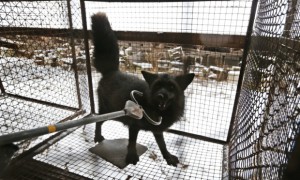The Guardian
 Two men will plead for dismissal of federal charges under obscure 2006 law for which damaging property or profit line of animal businesses can carry terrorism conviction despite absence of violence
Two men will plead for dismissal of federal charges under obscure 2006 law for which damaging property or profit line of animal businesses can carry terrorism conviction despite absence of violence
Two animal rights activists who have served prison terms for releasing mink and foxes from fur farms in the US midwest are facing federal charges that could see them sentenced to a further 10 years and branded for life as terrorists.
The two activists, Kevin Johnson, 27, and Tyler Lang, 25, will appear in a federal district court in Chicago on Thursday to plead for the federal charges to be dismissed. Lawyers for the defendants will argue that the counts, brought under an obscure 2006 law, are an inappropriate use of the concept of terrorism that threatens to stop free speech across the animal rights movement.
The hearing marks the first time that the law, the Animal Enterprise Terrorism Act (AETA), will be legally challenged as a violation of the US constitution.
Congress passed the AETA eight years ago under heavy lobbying from the pharmaceutical, fur and farming industries. Under its terms, anyone who damages the property or the profit line of an animal business and who uses “interstate commerce” such as a cellphone or the internet to carry out the action can be convicted of terrorism even though no violence is involved.
That applies to the two defendants, who were served the federal charges last July even though they have never been accused of any act of violence.
“These charges demean the definition of terrorism. They not only violate the defendants’ individual rights, but also serve to chill the first amendment rights of an entire movement,” said Rachel Meeropol, a staff attorney with the Center for Constitutional Rights who is representing the men.
The two Los Angeles-based activists have already served sentences under state law of up to 30 months after their car was searched in a routine traffic stop in Illinois. Police found bolt and wire cutters, ski masks and camouflage clothing.
The equipment was deemed to be “burglary tools” and they were prosecuted. Lang was released from prison on a plea deal in November and is out on bond, while Johnson remains in custody awaiting the federal trial. They have both pleaded not guilty to the terrorism charges.
In Thursday’s hearing at the US district court for the northern district of Illinois, the defendants will argue that the AETA is a violation of constitutional due process because it applies the term “terrorism” to the nonviolent theft of private property. Their motion to dismiss the charges points out that though there is no single definition of terrorism agreed in international or domestic law, a common feature of all accepted classifications is the wielding or threat of violence.
It is not known how many people have been prosecuted under the AETA, though the numbers are small. The first prosecution in 2008 was of four Californian animal rights activists – Joseph Buddenberg, Maryam Khajavi, Nathan Pope and Adriana Stumpo – who were charged as terrorists having chalked the sidewalk, chanted and leafleted outside the homes of biomedical scientists who had conducted animal testing.
Those charges were thrown out in 2010 on grounds that they lacked “factual specificity”.
In 2011, in Blum v Holder, five animal rights activists challenged the AETA as an unconstitutional infringement of their free speech. Their lawsuit was dismissed last year after federal judges ruled that the activists had no standing to bring the case.
In the terrorism indictments of Johnson and Lang, the duo are accused of driving across Iowa, Wisconsin and Illinois in August 2013 and “interfering with the operations” of a mink farm and a fox farm. They were alleged to have “intentionally damaged and caused the loss of real and personal property” resulting in “economic damage exceeding $10,000”.
They released about 2,000 mink from cages and painted the slogan “liberation is love” in red paint over a barn, according to press reports.
In a statement released by their support group soon after the federal charges were pressed, Lang said: “The government’s ‘terrorist’ targeting of two friends with a history of speaking out against injustice is an affront to the meaning of what violence really is, and a slap in the face to a public that sadly knows what terrorism actually looks like.”

